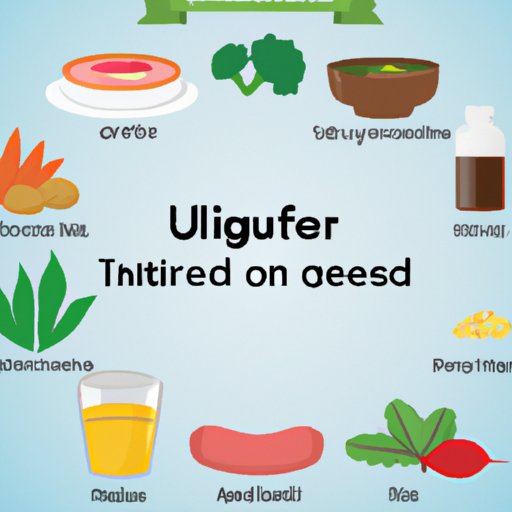Introduction
An ulcer is a sore or lesion that develops in the lining of your stomach or intestines. It can be caused by a variety of factors, including infection with a bacteria called Helicobacter pylori (H. pylori), excessive stress, or certain medications. Symptoms of an ulcer include abdominal pain, nausea, vomiting, bloating, and loss of appetite.

An Ulcer Diet: What to Eat and Avoid
If you have an ulcer, it’s important to follow a special diet to help reduce your symptoms. The following are some general guidelines for an ulcer diet.
Foods to Include in an Ulcer Diet
Eating a balanced diet that includes a variety of nutrient-rich foods can help reduce inflammation and promote healing. Here are some foods to include in an ulcer diet:
- High-fiber foods: Eating plenty of high-fiber foods such as fruits, vegetables, beans, and whole grains can help reduce inflammation and keep your digestive system functioning properly. According to a study published in the Journal of Gastroenterology and Hepatology, a high-fiber diet may help reduce the risk of developing an ulcer.
- Lean proteins: Lean proteins such as fish, poultry, and tofu provide essential nutrients and help support the healing process.
- Healthy fats: Healthy fats such as olive oil, avocados, and nuts are beneficial for ulcer patients because they help reduce inflammation and provide essential vitamins and minerals.
- Low-acid fruits and vegetables: Eating low-acid fruits and vegetables such as bananas, apples, and broccoli can help reduce irritation of the stomach lining.
- Probiotic-rich foods: Probiotics are beneficial bacteria that can help balance the levels of “good” and “bad” bacteria in your gut. Eating probiotic-rich foods such as yogurt, kefir, and sauerkraut can help reduce inflammation and improve digestion.
Foods to Avoid with an Ulcer
Certain foods can irritate the stomach and make ulcer symptoms worse. Here are some foods to avoid if you have an ulcer:
- Spicy or acidic foods: Spicy and acidic foods such as tomatoes, hot peppers, citrus fruits, and vinegar can aggravate the stomach lining and worsen ulcer symptoms.
- Caffeinated beverages: Caffeine can increase stomach acid production and lead to heartburn. It’s best to avoid caffeinated beverages such as coffee, tea, and soda.
- High-fat meats: High-fat meats such as bacon, sausage, and beef can increase inflammation and cause indigestion.
- Alcohol: Alcohol can irritate the stomach lining and increase the risk of developing an ulcer. It’s best to avoid alcohol if you have an ulcer.
A Guide to Eating with an Ulcer: Foods to Include and Avoid
It can be tricky to navigate the grocery store when you have an ulcer. Here are some tips for shopping and meal planning:
Breakfast Ideas
- Overnight oats with chia seeds
- Protein smoothie with almond butter
- Poached eggs on toast
Lunch and Dinner
- Lentil soup
- Baked salmon with quinoa
- Roasted turkey with steamed vegetables
Snacks
- Hummus and crackers
- Greek yogurt with berries
- Trail mix

Nutritional Strategies for Managing Ulcer Symptoms
In addition to following an ulcer diet, there are several other nutritional strategies that can help reduce ulcer symptoms:
- Increase Fiber Intake: Eating plenty of high-fiber foods can help reduce inflammation and keep your digestive system functioning properly.
- Avoid Processed Foods: Processed foods are often high in saturated fat and sodium, which can increase inflammation and worsen ulcer symptoms.
- Limit Alcohol Consumption: Too much alcohol can irritate the stomach lining and increase the risk of developing an ulcer. It’s best to limit your alcohol consumption if you have an ulcer.
10 Healthy Foods for People with Ulcers
The following are 10 healthy foods that can help reduce ulcer symptoms:
- Almonds: Almonds are a great source of fiber, protein, and healthy fats, all of which can help reduce inflammation.
- Apples: Apples are a low-acid fruit that can help reduce irritation of the stomach lining.
- Bananas: Bananas are a nutritious and easy-to-digest fruit that can help reduce inflammation.
- Broccoli: Broccoli is packed with fiber, vitamins, and minerals, and it’s a great way to get your daily dose of antioxidants.
- Carrots: Carrots are a good source of fiber and beta carotene, which can help reduce inflammation.
- Kefir: Kefir is a fermented dairy product that’s rich in probiotics and can help improve digestion.
- Oatmeal: Oatmeal is a great source of fiber and can help reduce inflammation.
- Sweet potatoes: Sweet potatoes are a nutritious and low-acid vegetable that can help reduce irritation of the stomach lining.
- Turmeric: Turmeric is an antioxidant-rich spice that has anti-inflammatory properties.
- Yogurt: Yogurt is a probiotic-rich food that can help improve digestion and reduce inflammation.

The Best Diet for an Ulcer: Foods That Help Reduce Symptoms
The best diet for an ulcer is one that focuses on reducing inflammation and promoting healing. Eating a balanced diet that includes plenty of fiber, lean proteins, healthy fats, low-acid fruits and vegetables, and probiotic-rich foods can help reduce ulcer symptoms. In addition, avoiding spicy and acidic foods, limiting caffeine and alcohol consumption, and avoiding processed foods can also help reduce symptoms.
Conclusion
Ulcers can be painful and uncomfortable, but following a special diet can help reduce symptoms and promote healing. Eating a balanced diet that includes plenty of fiber, lean proteins, healthy fats, low-acid fruits and vegetables, and probiotic-rich foods can help reduce inflammation and promote healing. In addition, avoiding spicy and acidic foods, limiting caffeine and alcohol consumption, and avoiding processed foods can also help reduce symptoms. With the right diet and lifestyle changes, you can manage your ulcer symptoms and live a healthier life.
(Note: Is this article not meeting your expectations? Do you have knowledge or insights to share? Unlock new opportunities and expand your reach by joining our authors team. Click Registration to join us and share your expertise with our readers.)
